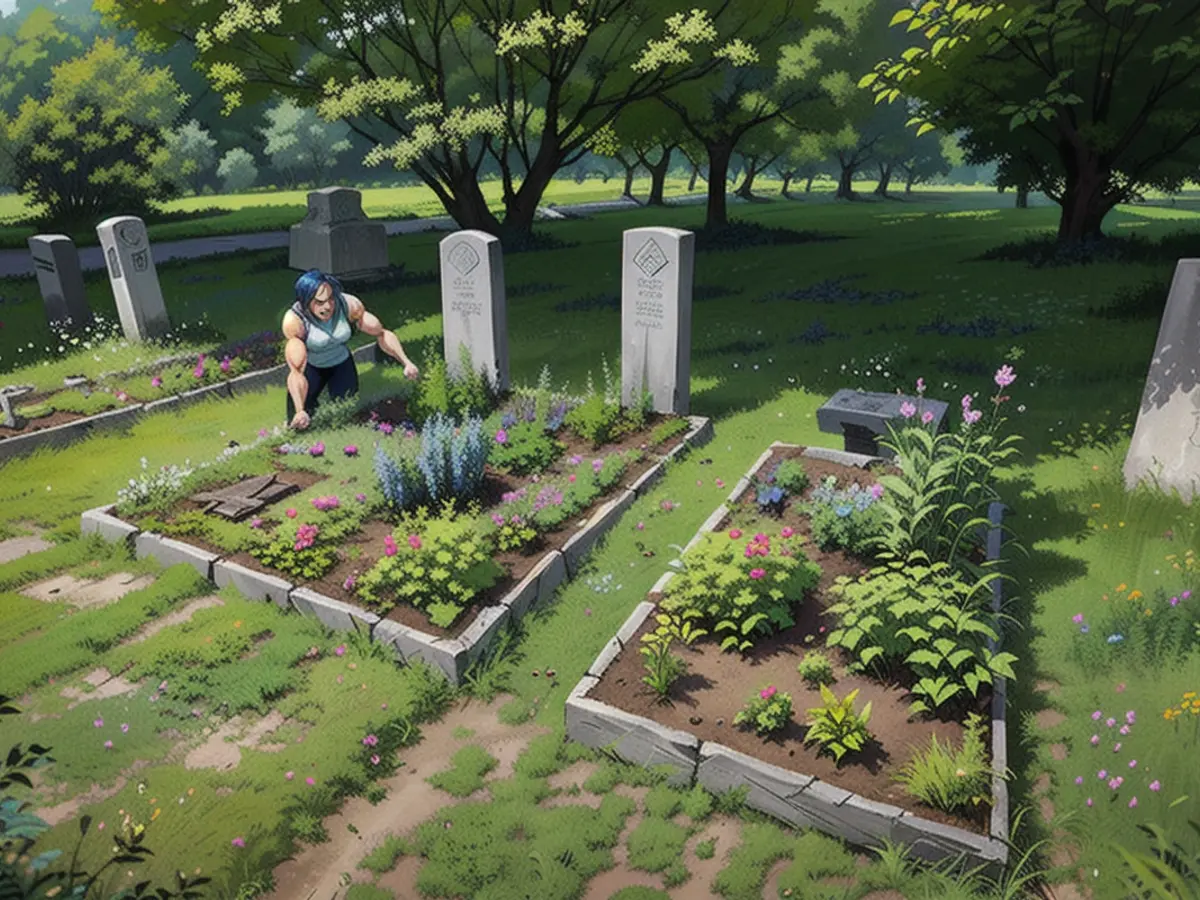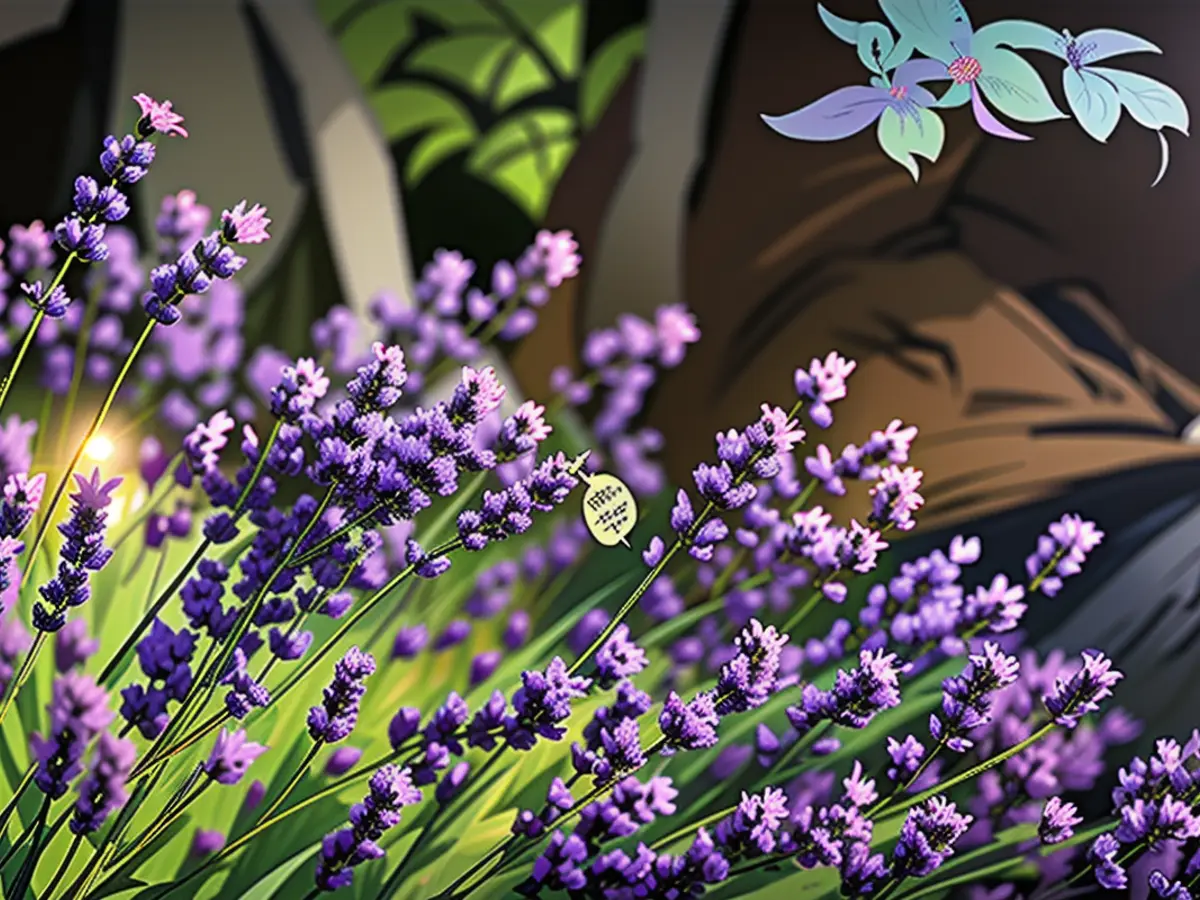Funerals may also welcome invertebrates.
The decrease in insect populations is a cause for concern among researchers and animal protection organizations. To combat this trend, they are launching awareness campaigns aimed at preserving these small creatures. One possible solution may be making cemeteries more insect-friendly.
In the Main Cemetery of Stuttgart, you'll usually find the same flowers neatly arranged on many graves—pansies, bellis, and occasionally gold lacquer. But those flowers might soon become a thing of the past, according to Lilith Stelzner, nature conservation officer at BUND Baden-Württemberg. With thousands of people buried there, the resting place could once again be teeming with life.
Three insect-friendly graves at the entrance serve as examples. They're covered in a diversity of native plants that attract a variety of insects, who feed on their nectar. "To create a space where insects can thrive, we need native plants like the common viper's bugloss, bellflowers, scabious knapweed, blood cranesbill, creeping groundsel, or the common ox tongue," says Stelzner. Industrialized agriculture and the lack of hedges, bushes, and monocultures make it challenging in many areas.
The Krefeld Study of 2017, showing the drastic decline in flying insect biomass in nature reserves, spurred people into action. "It's been a real wake-up call," says Peter Weißhuhn, an insect expert from the nature conservation organization WWF. Local authorities have a crucial role in preserving insects. By adjusting the mowing schedule and leaving standing plants, they can help protect flower meadows and the insects that rely on them.
NABU is focusing on insects in 2022 with its "Insect Summer" campaign, aiming to record the number of insect species found in a natural setting. Currently, there are 33,500 species in Germany and 1.2 million worldwide.
Protecting insects: more than just an ecological imperative
Why should we go to such lengths to protect insects? Stelzner offers several reasons. "The most significant one is that they're at the base of the food chain; if insects disappeared, it would be lethal for everything that comes after them, like birds, bats, and amphibians." Urban areas can also help secure a better future for insects. By transforming parks, playgrounds, and roadside areas into insect havens, we can support pollinating creatures like bees, butterflies, wasps, and hoverflies.
A documentary, titled "Insect Protection in the Community," by the Association of Towns and Municipalities and the Federal Agency for Nature Conservation, offers useful examples of how to make towns more insect-friendly. Ideas include leaving unsealed areas, creating flower strips, avoiding pesticides and artificial light sources, and adopting insect-friendly mowing techniques.
The beauty of native flowers
It's unclear whether residents of Stuttgart will appreciate the simplified grave decorations. Unlike traditional ornamental plants, not all native plants bloom simultaneously. However, Stelzner predicts that people will eventually understand the benefits and include more native plants in their gardens. "Hardy, native plants require less water and maintenance than exotic plants."
Thomas Schmitt, the Director of the Senckenberg German Entomological Institute, suggests embracing disorder in our gardens. "The English lawn is the death of insects."
Insects' importance to humans cannot be understated. "If we didn't have insects to pollinate our plants, our food options would be rather limited: no apples, pears, or blueberries—only potatoes, cereals, and corn," explains Schmitt. Insects also play a vital role in decomposing animal waste and carcasses, preventing unpleasant consequences like maggots and flies.
The bull beetle was chosen as "Insect of the Year" by NABU because it feeds on animal waste, significantly contributing to soil improvement. Unfortunately, dung beetles face habitat loss and the use of deworming agents on grazing animals.

Read also:
- This will change in December
- Dikes withstand water masses so far - Scholz holds out the prospect of help
- Fireworks and parties ring in 2024 - turn of the year overshadowed by conflicts
- Attacks on ships in the Red Sea: shipping companies avoid important trade route
The nature conservation organization NABU is focusing on insects in 2022 with its "Insect Summer" campaign, aiming to increase public awareness and record the number of insect species in a natural setting. This initiative is part of their broader efforts to support species protection, an issue that aligns with BUND's goals.
In Stuttgart, BUND's Baden-Württemberg branch is advocating for more insect-friendly cemeteries, such as the one in the Main Cemetery, where native plants attract various insect species. This trend could potentially be encouraged through collaborations with local authorities, as demonstrated by the Insect Protection in the Community documentary.
The Krefeld Study found a drastic decline in flying insect biomass in nature reserves, emphasizing the importance of insect protection efforts. Organizations like WWF and NABU are working on preserving these tiny yet crucial creatures, not only for ecological reasons but also because insects play a vital role in human food chains and decomposing animal waste.
Source: www.ntv.de







